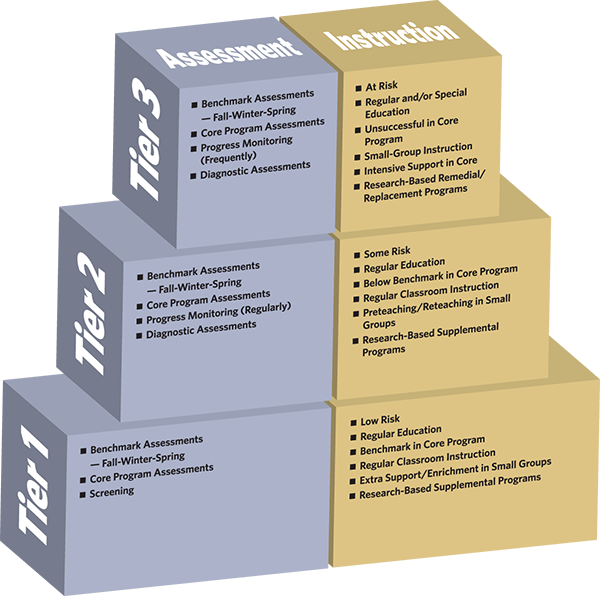Response to Intervention
What Is RTI?
Response to Intervention (RTI) is a well-developed, collaborative process involving regular and special education. RTI emphasizes collaborative decision-making using periodic assessment, differentiated instruction in classrooms, and increasingly intense interventions as needed. The critical components of RTI are well-designed curriculum and instruction, interventions at increasing levels of intensity, well-trained staff, and assessment-driven decision-making.
Most schools develop a multi-tiered RTI model to provide struggling learners with services and interventions at increasing levels of intensity, as illustrated in this RTI pyramid:

In an RTI model all students receive standards-based comprehensive reading instruction with differentiated instruction as needed. Universal screening identifies students who need additional diagnostic assessment and strategic supplementary instruction. These students receive increasingly more intensive instruction with data-driven program adjustments as indicated by periodic assessments of progress. A few students, whose skills are far behind their peers, may need to receive only specialized intervention, but for the shortest amount of time as possible. This cycle of intervention, progress monitoring, and adjustment of the intervention continues—even if a determination for special education eligibility is made—in a seamless collaboration between regular and special education.
 Learn more: Tiers of the RTI pyramid
Learn more: Tiers of the RTI pyramid
RTI vs. Multi-Tiered System of Supports (MTSS)
RTI and Multi-Tiered System of Supports (MTSS) are sometimes used interchangeably among educators, but they are not exactly the same. An RTI framework addresses students' academic needs, but the scope of MTSS is more comprehensive. Student learning is still central to the MTSS model, but it also addresses other factors, including the social, emotional, and behavioral development of students.
Read Naturally Assessments in an RTI Model
Read Naturally's valid and reliable oral reading fluency assessments and diagnostic phonics assessment have been designed to monitor and document student progress. Read Naturally assessments can be used to screen for students who are at risk for reading difficulty, to diagnosis specific instructional needs, and/or to assess student progress over time.
Quick Phonics Screener is used with students in any of the three tiers. Reading Fluency Progress Monitor is appropriate for frequent assessments of students in Tier 1 and Tier 2.
 Learn more: Read Naturally assessments in an RTI model
Learn more: Read Naturally assessments in an RTI model
 | Reading Fluency Progress Monitor Continuous student monitoring throughout the year to measure growth in reading proficiency  Learn more about Reading Fluency Progress Monitor Learn more about Reading Fluency Progress Monitor |
 | Quick Phonics Screener Diagnostic assessment to identify strengths and needs in phonics/decoding skills  Learn more about Quick Phonics Screener Learn more about Quick Phonics Screener |
Using Read Naturally Programs as RTI Reading Interventions
Read Naturally programs are well-suited to support core reading programs in an RTI Model.
- Well-designed curriculum and instruction.
- Research-based interventions at increasing levels of difficulty and intensity.
- High-quality instructional supports to empower self-directed learning.
- Systematic documentation of student performance for instructional decision-making.
- Training for staff.
 Learn more: Using Read Naturally programs as RTI reading interventions
Learn more: Using Read Naturally programs as RTI reading interventions
 | Read Naturally® Live Individualized reading intervention program using web-based software  Learn more about Read Naturally Live Learn more about Read Naturally Live |
 | Read Naturally® Encore New individualized reading intervention program using printed stories and audio CDs  Learn more about Read Naturally Encore Learn more about Read Naturally Encore |
 | One Minute Reader® Live A component of web-based Read Live for supplemental, independent reading  Learn more about One Minute Reader Live Learn more about One Minute Reader Live |
 | One Minute Reader® Books/Audio CDs Printed books with audio support on CDs for supplemental, independent reading  Learn more about One Minute Reader Books/Audio CDs Learn more about One Minute Reader Books/Audio CDs |
 | Read Naturally® GATE Small-group instruction to teach phonemic awareness, phonics, high-frequency words, and fluency  Learn more about Read Naturally GATE Learn more about Read Naturally GATE |
 | Take Aim! at Vocabulary Small-group/individual instruction to teach vocabulary using high-quality words and nonfiction text  Learn more about Take Aim at Vocabulary Learn more about Take Aim at Vocabulary |
 | Word Warm-ups® Individualized phonics program to develop automaticity in decoding  Learn more about Word Warm-ups Learn more about Word Warm-ups |
 | Signs for SoundsTM Small group/individual instruction to teach phonics and high-frequency words through spelling  Learn more about Signs for Sounds Learn more about Signs for Sounds |
 | Funēmics Small-group instruction to teach phonemic awareness using scripted curriculum and interactive exercises.  Learn more about Funēmics Learn more about Funēmics |
Response to Intervention/MTSS
- What Is RTI?
- Tiers of the RTI Pyramid
- Read Naturally Assessments in an RTI Model
- Using Read Naturally Programs as RTI Reading Interventions
- MTSS for Reading
- Is Response to Intervention Really Different?
- New Roles in Response to Intervention (PDF)
- Takeaways from the New Study on Response to Intervention
RTI/MTSS Resources
Alignment With Recommended Practices
- Read Naturally and Recommended Practices
- Read Live Programs Align with IES Recommendations for Foundational Reading Skills
- GATE+ Aligns with IES Recommendations for Building Foundational Reading Skills
- Take Aim! at Vocabulary Aligns with IES Recommendations for Improving Adolescent Literacy
- Signs for Sounds Aligns With Common Core Spelling Checklist
Challenges We Address
Please let us know what questions you have so we can assist. For Technical Support, please call us or submit a software support request.